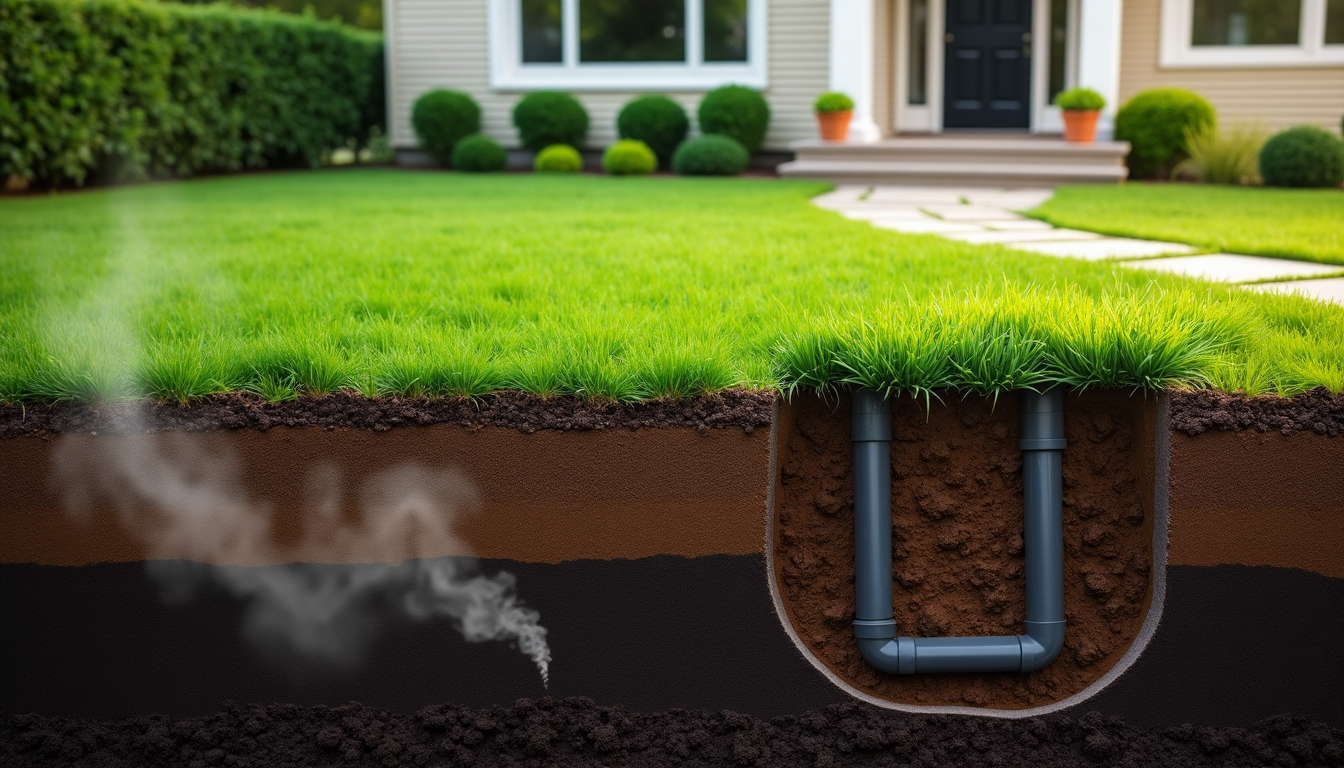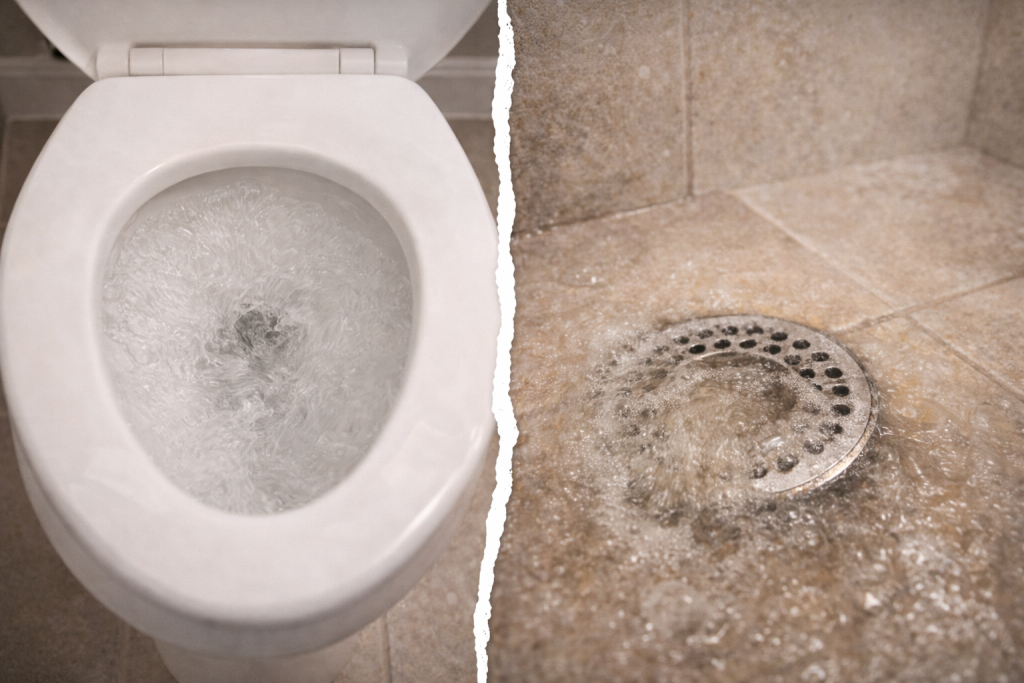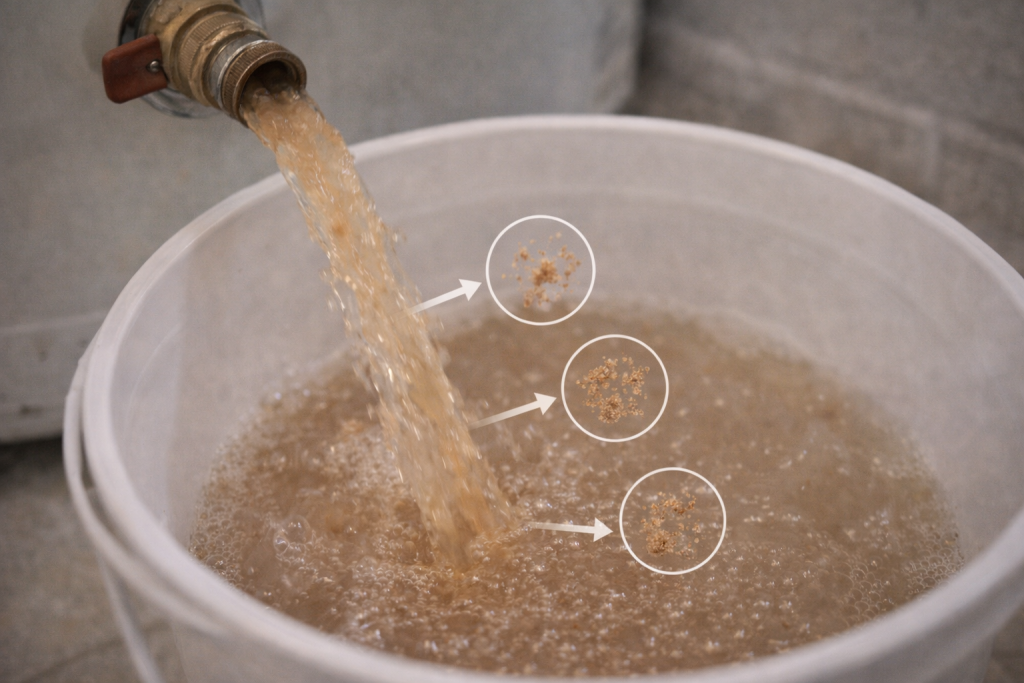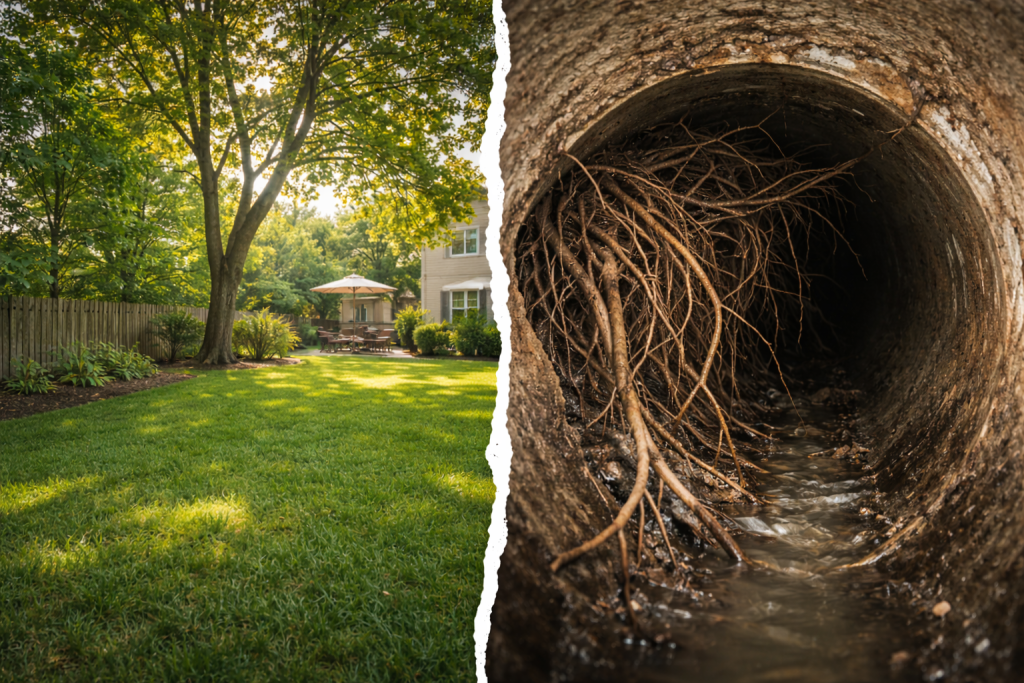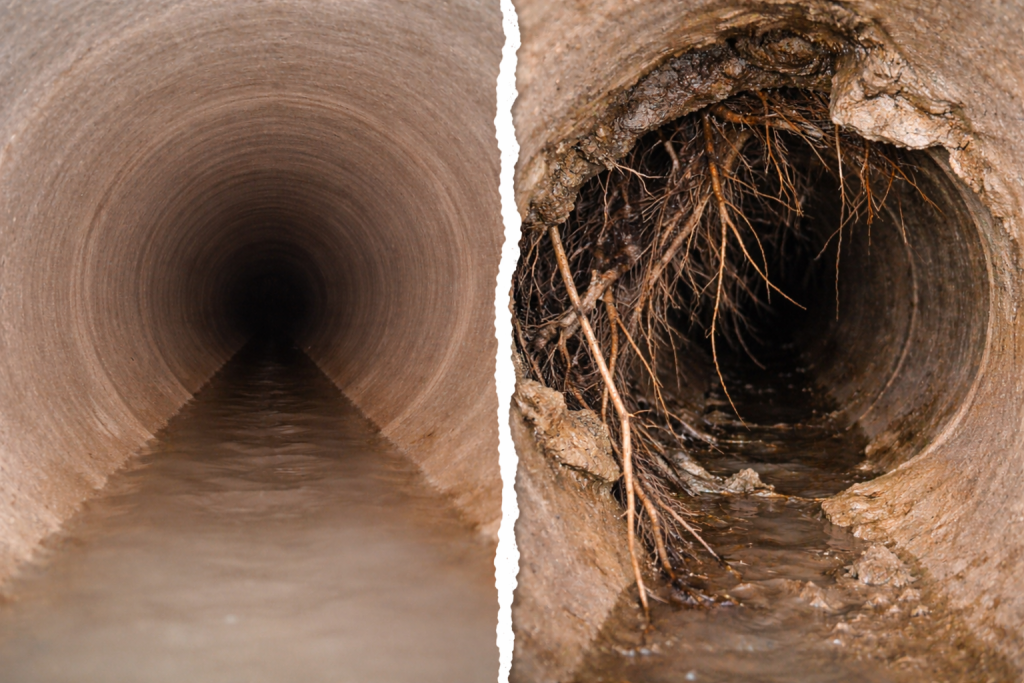Nobody wants to deal with a septic tank disaster at 3 AM on a Sunday. Trust me, I’ve seen it happen more times than I can count.
Your septic tank quietly handles thousands of gallons of household waste every year, but when it gets full, it sends clear warning signs that you need to act fast. Recognizing these signs of a full septic tank early can save you from expensive repairs and messy emergencies.
Whether you’re a new homeowner or have lived with a septic system for years, knowing the warning signs of septic tank problems is crucial. Let’s explore the 7 critical signs that your septic tank is screaming for attention – before it’s too late.
Foul Sewage Odors Inside and Outside

Image Source: Pete’s Outflow Technicians
One of the most telltale signs of a full septic tank is the presence of foul sewage odors, both inside and outside your home. If you’re catching whiffs of rotten eggs or sewage smells, your nose is telling you something’s wrong.
A properly functioning septic system should be completely odor-free. These unpleasant smells come from gasses like hydrogen sulfide, methane, and carbon dioxide that are produced when bacteria break down waste in your tank. When these gasses escape instead of staying contained, it’s one of the clearest warning signs that your septic tank is full or experiencing problems.
Inside your home, you might notice these odors:
- Coming from drains or toilets
- Near basement floor drains
- Around plumbing fixtures
- Through sinks that aren’t used often
If you’re detecting sewage smells outside, particularly near your septic tank or drain field, this could indicate a serious issue like a damaged tank lid, a full tank, or a failing drain field. These aren’t just unpleasant nuisances – in high concentrations, septic gasses can be toxic and potentially dangerous to your health.
Remember, these odors are your septic system’s way of waving a red flag. As a professional plumber, I always tell my customers that ignoring these smells isn’t just about living with an unpleasant odor – it’s about preventing more serious problems down the line.
Slow-Draining Fixtures Throughout Home

Image Source: Roto-Rooter
When multiple drains in your home start moving slower than a snail’s pace, it’s time to pay attention. As a plumber with years of experience, I can tell you that slow-draining fixtures throughout your home are one of the most reliable warning signs of septic tank problems.
Unlike a single clogged drain that might just need a plunger, when all your fixtures are affected simultaneously, it’s usually pointing to a bigger issue with your septic system. You might notice:
- Bathtubs and showers taking longer to empty
- Sinks draining sluggishly across multiple rooms
- Toilets showing weak flush power
- Multiple fixtures affected at the same time
What makes this particularly concerning is that system-wide slow drains often indicate your septic tank is reaching its capacity. When the tank fills up with solid waste, it leaves less room for new wastewater to enter, causing backups throughout your home’s plumbing system.
Don’t make the mistake of treating this like a regular clog. While it might be tempting to reach for chemical drain cleaners, these can actually harm your septic system’s beneficial bacteria. Instead, this is the time to call in a professional to check if your tank needs pumping or if there are issues with your inlet or outlet baffles.
Gurgling Sounds from Plumbing

Image Source: Elvis Service Company
Listen closely – your plumbing system might be trying to tell you something important. As a plumber, I’ve learned that strange gurgling sounds from your drains, toilets, or pipes are more than just annoying noises – they’re important warning signs that your septic tank is full.
Think of these gurgling sounds like your septic system’s version of a warning bell. They typically occur when air gets trapped in your plumbing system and bubbles back through your pipes. The most common causes include:
- A full septic tank blocking proper flow
- Trapped air from system blockages
- Problems with plumbing vents
- Clogged pipes between house and tank
- Failing drain field
These sounds are particularly noticeable when you’re using lots of water, like during laundry day or after multiple showers. A properly functioning septic system should be virtually silent, so any consistent gurgling needs attention.
What makes gurgling especially concerning is that it often indicates your tank is struggling to handle incoming water. When combined with other warning signs we’ve discussed, like odors or slow drains, gurgling becomes an even more serious red flag that your septic tank needs immediate attention.
Remember, these sounds aren’t just your pipes being chatty – they’re your septic system’s way of saying “Help!” before a more serious problem develops.
Sewage Backing Up Into Fixtures

Image Source: ServiceMaster Chicago, IL
This is perhaps the most serious warning sign of septic tank problems you can encounter – raw sewage backing up into your home’s fixtures. When you see wastewater coming back up through your drains, toilets, or basement fixtures, you’re dealing with an emergency situation that requires immediate action.
As a plumber, I’ve seen how quickly this can escalate from a minor inconvenience to a major health hazard. When sewage backs up, it’s usually because your septic tank is completely full and can no longer accept any new waste. This is one of the most critical signs of a full septic tank that demands immediate attention.
If you experience sewage backup, take these immediate steps:
- Stop all water usage in your home
- Keep children and pets away from affected areas
- Turn off electrical power in flooded areas
- Open windows for ventilation
- Contact a septic professional immediately
The health risks associated with sewage backup are serious – exposure to harmful pathogens can cause severe gastrointestinal issues, skin infections, and other health problems. Never attempt to clean up sewage yourself without proper protection and expertise.
Remember, sewage backup isn’t just an unpleasant inconvenience – it’s your septic system’s final desperate warning that something is seriously wrong and needs professional attention right away.
Standing Water Around Septic Area

Image Source: Quality Septic
If you spot puddles of water around your septic system when it hasn’t rained, your tank is sending you an urgent message. As a plumber, I’ve seen how standing water near septic areas can quickly escalate from a minor concern to a major problem.
Look for these warning signs in your yard:
- Pools of water around the septic tank or drainfield
- Spongy, soggy ground near the system
- Unusually damp spots that persist even in dry weather
- Water puddles that appear after using lots of household water
Standing water is often a sign that your septic tank is completely full and can’t handle additional wastewater. When this happens, the excess water has nowhere to go but up, saturating the ground above. This situation is particularly concerning because it means untreated wastewater could be reaching the surface, creating serious health risks for your family and potentially contaminating nearby water sources.
If you notice standing water, it’s critical to act quickly. This issue won’t resolve itself, and continuing to use water in your home will only make the situation worse. A full septic tank combined with saturated soil can lead to system failure and expensive repairs if not addressed promptly.
Unusually Green Grass Over Tank

Image Source: Reddit
Here’s something that might surprise you – a patch of incredibly lush, green grass over your septic system isn’t the lawn success story you might think it is. In fact, as a plumber, I consider an unusually vibrant patch of grass one of the most telling warning signs that your septic tank is full.
Think of it like this: when your septic system is struggling, it’s essentially creating its own fertilizer factory underground. That suspiciously green patch might look like it belongs on a golf course, but it’s actually telling you that nutrients from wastewater are leaking into the soil instead of being properly processed.
Watch for these specific signs:
- Grass that’s notably greener than surrounding areas
- Unusually thick or fast-growing patches
- Areas that stay wet when the rest of your yard is dry
- Grass that’s thriving even during dry spells
Don’t wait to investigate these emerald patches. What looks like a gardening victory today could signal expensive septic repairs tomorrow. The earlier you get your system inspected, the better your chances of avoiding major issues. Remember, when it comes to septic systems, sometimes the grass really isn’t greener on the other side.
High Water Level in Septic Tank

Image Source: ACE Septic & Waste in Tampa Bay
Checking the water level in your septic tank provides crucial insight into your system’s health. A properly functioning tank maintains a specific water level – right at the bottom of the outlet pipe. Any deviation from this normal level is one of the most reliable indicators of septic system problems.
When inspecting your tank, watch for these critical water level indicators:
- Water above the outlet pipe suggests a clogged outlet or failing drainfield
- Levels below the outlet pipe could mean your tank has a leak
- Fluctuating levels might indicate groundwater infiltration
- Sewage flowing over baffles signals immediate attention needed
Never attempt to measure tank levels yourself – toxic gasses make this extremely dangerous. A professional inspection is essential when water levels seem off, especially if you’ve noticed other warning signs we’ve discussed. Your septic professional will measure both liquid levels and the thickness of scum and sludge layers to determine if pumping is needed.
Remember, your tank should be pumped when sludge and scum combined reach about 30% of the tank’s volume. Regular professional inspections every 3-5 years can help catch water level issues before they become emergencies.
Conclusion
Septic tank problems rarely improve on their own – they only get worse and more expensive when ignored. Each warning sign we’ve discussed, from foul odors to suspiciously green grass patches, serves as your septic system’s way of asking for help before disaster strikes.
Your septic system handles thousands of gallons of waste yearly, making it one of your home’s most critical systems. Recognizing these warning signs early can save you from costly repairs, health hazards, and those dreaded middle-of-the-night emergencies.
Smart homeowners know that prevention beats reaction every time. Schedule regular inspections every 3-5 years, pay attention to these warning signs, and never hesitate to call a professional when something seems off. Remember – what might seem like a minor inconvenience today could become a major catastrophe tomorrow if left unchecked.
Trust your senses, trust these warning signs, and most importantly, trust qualified professionals to keep your septic system running smoothly. After all, a well-maintained septic system is something you’ll never have to worry about at 3 AM on a Sunday.


